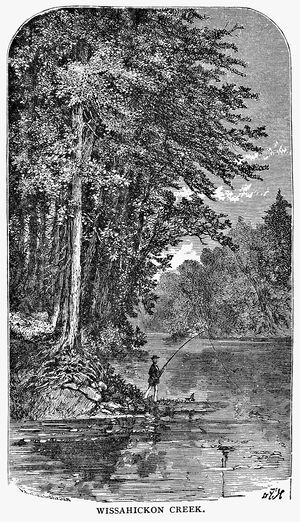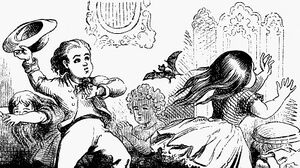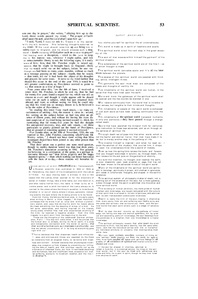Wissahickon Creek
Universality of Spirit Influence
Universality of Spirit Influence.—Mr. Tscherepanoff, a Russian scientific man, published in 1854 or 1855, at St. Petersburg, the result of his investigations with the Lamas in Thibet. He says (having been a witness in one or two cases) that the Lamas, when applied to for the discovery of stolen or hidden things, take a little table, put one hand on it, and after nearly half an hour, the table is lifted up by an invisible power, and is (with the hand of the Lama always on it) carried to the place where the thing in question is to be-found, whether in or out of doors, where it drops, generally indicating exactly the spot where the missing article is to be found.
Heinrich Heine, the famous German poet, in his early years, when writing in Berlin a little tragedy, “William Ratcliffe,” confesses that he wrote it all at once and without a preliminary sketch, and says that during his work he heard above his head something like the dapping of wings of a bird. He felt quite astonished, and having inquired of his friends, young poets, whether they had ever experienced anything of the kind, he received a negative answer. Now this little tragedy is a spirit story from the beginning to the end.
These are the thoughts of the celebrated German philosopher, Kant: “The day will come when it will be proved that the human soul is already, during its life on earth, in a close and indissoluble connection with the world of spirits; that their world influences ours and impresses it profoundly; and that we remain unconscious of it as long as everything goes right with us.”
<Untitled> (Theism declares that God dispenses)
Theism declares that God dispenses health and inflicts disease, and sickness and illness are regarded by the theist as visitations from an angered Deity, to be borne with meekness and content Atheism declares that physiological knowledge may preserve us from disease by preventing our infringing the laws of health, and that sickness results, not as the ordinance of offended Deity, but from ill-ventilated dwellings and workshops, bad and insufficient food, excessive toil mental suffering, exposure to inclement weather, and the like.— C. Bradlaugh.
A Seance with Mrs. Everitt
...
Editor's notes
- ↑ Wissahickon Creek by unknown author
- ↑ Universality of Spirit Influence by unknown author, Spiritual Scientist, v. 1, No. 5, October 8, 1874, p. 53
- ↑ Theism declares that God dispenses by Bradlaugh, C., Spiritual Scientist, v. 1, No. 5, October 8, 1874, p. 53
- ↑ A Seance with Mrs. Everitt by Kislingbury, Emily
- ↑ image by unknown author



